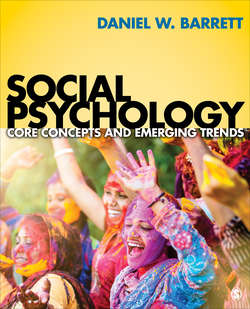Читать книгу Social Psychology - Daniel W. Barrett - Страница 182
На сайте Литреса книга снята с продажи.
Confirming the Self: Self-Verification
ОглавлениеThe final “self” concept that we will discuss in this chapter is based in a motive related to self-regulation and self-concept: what is called the need for self-consistency or self-verification. In the chapter on persuasion we’ll describe consistency theory in more detail; for now suffice it to say that people often seek feedback from others that is consistent with their self-concept. That is, they wish to confirm or verify what they believe is true about themselves, a tendency called self-verification (North & Swann, 2009a; Swann, 1990; Valentiner, Hiraoka, & Skowronski, 2014). According to Swann (1990), people want to maximize their perceptions of control and predictability with respect to themselves and their situation, and doing so involves confirming one’s beliefs about the self. Perhaps, paradoxically, people don’t just want others to verify their positive attributes, but they also seek feedback consistent with their self-identified negative attributes (Swann, 1990; Valentiner, Skowronski, McGrath, Smith, & Renner, 2011). For instance, in one study participants who held negative self-views chose to interact with individuals who had negatively evaluated them rather than others who had given them a positive evaluation (Swann, Pelham, & Krull, 1989). Note how this motivation differs from that for accurate self-knowledge and for self-enhancing information: Seeking true accuracy would require soliciting and being open to feedback that may not be consistent with one’s self-view, whereas self-enhancing implies searching for and/or attending to only positive feedback (Sedikides & Gregg, 2003). In contrast, self-verification invokes strategies designed to reinforce one’s self-concept, whether or not it results in accurate self-knowledge or unflattering evaluation (Swann, 1990; Swann, Chang-Schneider, & Angulo, 2008). Despite the fact that self-verification can provide individuals with negative feedback, this and other drawbacks are often outweighed by the benefits of self-verification (North & Swann, 2009b). By way of example, people tend to seek romantic partners who help verify their self-concepts, including their less desirable features (Swann et al., 2008).
Self-Verification: Seeking information that will confirm one’s self-concept
